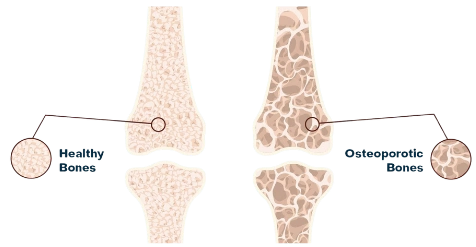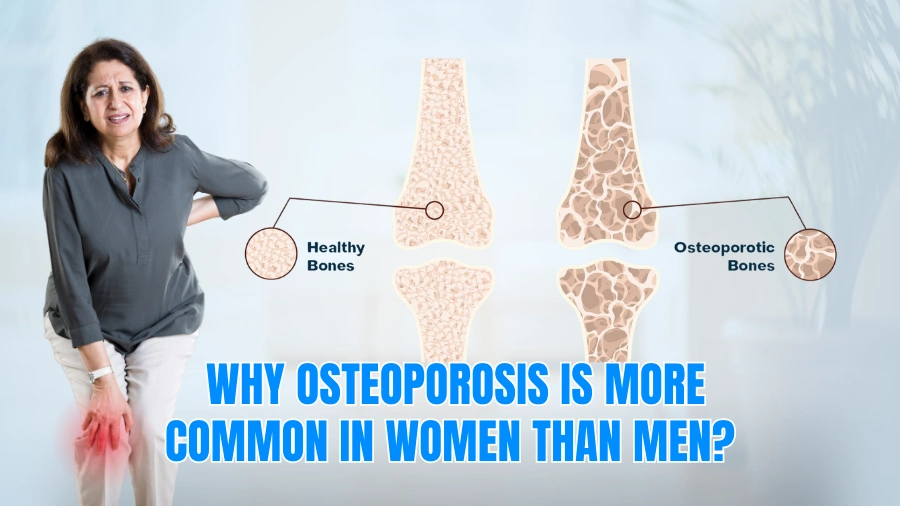“When it comes to bone health, women face challenges men often don’t — from hormonal changes to natural differences in bone structure. My goal is to help women recognize these risks early, protect their bones, and keep living life to the fullest.” – Dr Azam Badar Khan, Orthopedic Knee Surgeon Dubai
Globally, over 200 million women are living with osteoporosis — a disease that silently weakens bones, increasing the risk of fractures. The International Osteoporosis Foundation reports that one in three women over the age of 50 will experience an osteoporosis-related fracture in their lifetime, compared to one in five men.
In the UAE, where lifestyle patterns, diet, and vitamin D deficiency are common concerns, osteoporosis in women in Dubai is not just an important health issue — it’s an urgent one. This blog explores why women are more prone to bone-related problems, how osteoporosis develops, and what you can do to protect your bones for life.

Understanding Why Women Are More Prone to Bone Issues?
Women naturally start with a lower peak bone mass than men, meaning their bones are already less dense even before age-related bone loss begins. Several biological and lifestyle factors increase their risk:
- Smaller bone size – Less structural strength from the outset
- Hormonal influence – Estrogen protects bones; when it drops, bone loss accelerates
- Pregnancy & breastfeeding – Can temporarily lower bone mineral levels
- Higher rates of autoimmune conditions – Which can impact bone density
- Lifestyle habits – Poor diet, limited exercise, and inadequate sun exposure
The reality is that why women have more bone health issues comes down to a mix of nature and nurture — some factors are beyond control, but many can be managed with awareness and action.
Osteoporosis Treatment: A Silent Threat to Women’s Bone Health
Osteoporosis literally means “porous bone.” It develops gradually and without symptoms, until a fracture happens — often from a minor fall or even a simple movement like bending or coughing.
- Most affected sites: Hip, spine, and wrist
- Increased risk post-menopause: Rapid bone loss occurs in the first 5–7 years after estrogen levels drop
- Serious consequences: Hip fractures can lead to disability, loss of independence, and in some cases, life-threatening complications
In Dubai and across the GCC, osteoporosis in women is often diagnosed late — regular bone density testing could change that.
How Hormonal Changes Affect Bone Density in Women?
Estrogen is one of the most important hormones for maintaining bone health. It helps regulate the balance between bone breakdown and bone building.
- Before menopause: Estrogen keeps bone breakdown in check
- After menopause: Estrogen levels fall sharply, increasing bone resorption
- Other hormonal changes: Conditions like thyroid imbalance or early menopause can worsen bone loss
This hormonal shift is why women in their 50s often notice faster changes in bone density — and why prevention should ideally start years earlier, with timely guidance and access to the best bone disorders treatments in Dubai.
Preventing Bone Loss: Tips for Maintaining Bone Health
The earlier you start protecting your bones, the better.
- Get enough calcium & vitamin D – Aim for 1,000–1,200 mg calcium and 600–800 IU vitamin D daily
- Do weight-bearing exercises – Walking, light jogging, dancing, and resistance training are best
- Avoid smoking – It speeds up bone loss
- Limit alcohol – More than 2 drinks daily can weaken bones
- Schedule bone scans – Especially after menopause or if you have risk factors
For bone health for women in Dubai, vitamin D supplementation is often essential due to limited sun exposure.
The Role of Diet and Exercise in Bone Health for Women
Nutrition Tips:
- Include dairy, leafy greens, salmon, and fortified plant-based milks for calcium
- Get vitamin D from oily fish, fortified foods, and safe sunlight
- Add magnesium and vitamin K-rich foods for better calcium absorption
Exercise Tips:
- Weight-bearing: Brisk walking, stair climbing, light aerobics
- Strength training: Free weights or resistance bands twice a week
- Balance training: Yoga, pilates, or tai chi to prevent falls
A healthy diet plus consistent movement is the most effective non-medical way to protect bone density.
Treatment Options for Women’s Bone Health Issues
When bone loss is detected, treatments focus on slowing it down and preventing fractures:
- Medications: Bisphosphonates, SERMs, hormone replacement therapy
- Supplements: Calcium and vitamin D tailored to your needs
- Physiotherapy: Builds muscle support and improves posture
- Procedures: Minimally invasive surgery for certain fractures (e.g., vertebroplasty)
Your treatment should be personalized, based on bone density test results, age, and health history.
Why Should Women Seek Regular Bone Health Assessments?
Bone density scans (DEXA scans) are painless, quick, and highly accurate.
- Early detection = early action
- Prevents fractures before they happen
- Helps track the effectiveness of treatments
In Dubai, women over 50 — and younger women with a family history or early menopause — should make bone health checks part of their regular health routine.
Why Choose Dr Azam Badar Khan for Women’s Bone Health?
Dr Azam Badar Khan is known for his expertise in treating osteoporosis in women in Dubai along with related conditions like arthritis and bone fractures. With a focus on accurate diagnosis and personalized care, he helps women maintain long-term bone strength and mobility.
Global Orthopedic Expertise
Over 20 years of surgical and non-surgical orthopedic experience in leading hospitals across India, Bahrain, and the UAE.
Specialist in Knee & Bone Health
Renowned for managing complex knee conditions and women’s bone health, including osteoporosis care.
Patient-Centered Approach
Committed to clear communication, active listening, and treatments tailored to each woman’s lifestyle.
Academic Excellence
Holds an M.B.B.S. from Magadh University and an M.S. in Orthopedics from Banaras Hindu University.
Professional Recognition
Active member of the American Academy of Orthopaedic Surgeons and other leading medical associations. Commitment to Excellence
Dedicated to restoring mobility, preventing bone loss, and improving quality of life for women of all ages.
What My Patient Says About My Treatment

“After years of back pain, I finally discovered it was osteoporosis. Dr Azam Badar Khan guided me through a treatment plan, and I feel stronger every month.”
– Mariam – Dubai

“I was nervous about getting a bone density test, but it was quick and painless. Thanks to Dr Azam Badar Khan, I caught my bone loss early.”
– Fatima – Abu Dhabi

“Menopause hit me hard, and I noticed joint aches almost daily. The lifestyle changes and supplements recommended by Dr Azam Badar Khan made a huge difference.”
– Aisha – Sharjah

“I fractured my wrist from a small fall, and that’s when I learned about osteoporosis. I’m now on a preventive plan thanks to Dr Azam Badar Khan’s advice.”
– Noor – Dubai

“As someone with a family history of bone problems, I wanted a proactive approach. Dr Azam Badar Khan’s check-up and plan gave me peace of mind.”
– Hanan – Al Ain

“I never realized vitamin D deficiency could affect my bones so much. The guidance from Dr Azam Badar Khan was life-changing.”
– Rania – Ajman
Patient FAQs
Q: At what age should women start checking their bone density?
Most should start by age 50, earlier if they have risk factors.
Q: Can osteoporosis be reversed?
Bone loss can’t be fully reversed, but treatment can stop further loss and strengthen bones.
Q: Is vitamin D deficiency common in Dubai?
Yes — due to limited sun exposure, many women require supplementation.
Q: Can exercise improve my bone density?
Yes, especially weight-bearing and strength training exercises.
Q: Do hormonal changes always cause bone problems?
Not always, but they significantly increase risk if preventive steps aren’t taken.
Book Your Appointment Today
If you’re concerned about osteoporosis in women or want a personalized bone health for women in Dubai plan, consult Dr Azam Badar Khan today.

